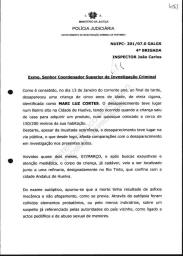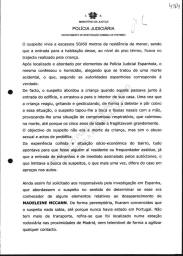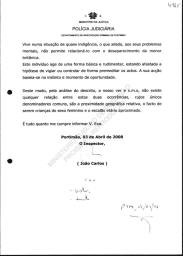| 16_VOLUME_XVIa_Page_4163. |
 |
| 16_VOLUME_XVIa_Page_4164. |
 |
| 16_VOLUME_XVIa_Page_4165. |
 |
As is known by many, on 13 January of the current year, in
the late afternoon, there disappeared a 5 year old child, of
gypsy ethnicity, identified as Mari Luz Cortes. The
disappearance took place in a suburb [district] of the City
of Huelva having occurred when the child left her house to
purchase something from a local shop [kiosk] about 150/200
metres from her home.
Despite the unusual occurrence, the disappearance was from a
public street which distances it from possible comparisons
with the disappearance under investigation in this [our]
case [in Portugal].
After almost two months, on 07 March, and after exhaustive
searches and media reports, the body of the child, already a
cadaver, came to be found next to a refinery, namely Rio
Tinto, on the outskirts of Andaluz de Huelva.
From the autopsy it was determined that death was a result
of asphyxia and not drowning as previously thought.
Probatory evidence was obtained through the autopsy, or at
least indications, about a suspect already referred to by
the authorities, of a neighbour of the parents linked with
paedophile activities and sexual abuse of minors.
The suspect lived scarcely 50/60 metres from the child's
home, the ground floor entrance of that [the suspect's] home
being on the route followed by the child.
After being located and approached by Spanish police the
suspect confessed to murder, alleging that it had been an
accidental death which was confirmed as being the truth by
the Spanish authorities.
In fact, the suspect approached the child when she passed by
the building entrance, and induced her into his house. Once
the child reacted, screaming and gesticulating, the suspect,
attempting to subdue her and put a stop to that, covered her
mouth and nose with his hand cutting off her air supply,
which culminated in death, to which the five year old
succumbed.
The suspect's objective had not been to kill the child but
to molest her sexually.
From past experience and the socio-economic character of the
district, everything pointed to it having been a local
resident or someone who commonly frequented that location,
the locals [natives] knowing immediately about any
strangers, which limited the the search for suspects, which
again, differs from our case.
Nevertheless, those responsible for the investigation in
Spain were asked if they knew of any matters that might
relate to the disappearance of Madeleine McCann.
Peremptorily they were convinced that the suspect knew
nothing, he never having been to Portugal. He had no
personal transport, as that was found in a garage near to
Madrid, nor a mobile phone with which to make any contact.
He lives in a situation of near indigence, coupled with
mental problems, that would not suggest any relationship
with the disappearance of the British minor.
This individual acted in a basic and rudimentary manner,
[thereby] setting aside any notion of vigilance or
premeditated action. His action was based on instinct and
momentary opportunity.
In this way, from the described analysis we can see, in my
opinion, there is no relationship between the two
occurrences whose sole common denominators are the relative
geographic location and the fact that they were female
children of similar age.
That is all that I wish to inform you, sir.
Portimao, 3 April 2008.
Inspector Joao Carlos.